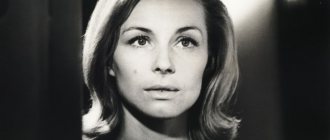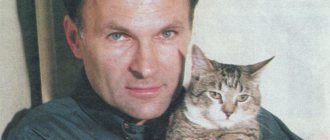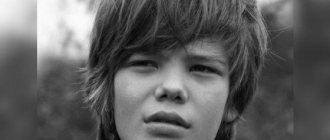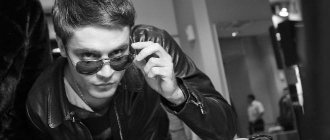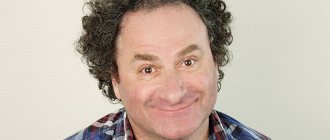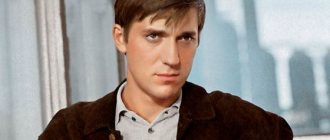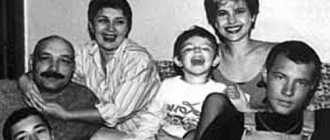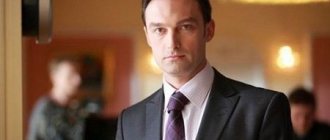BIOGRAPHY
Vladimir Khotinenko was born in the city of Slavgorod, Altai Territory. My father worked as a mechanic, and my mother changed many professions - from machine tool to accounting. “We lived in a wooden house that my father built with his own hands. Of course, my entire boyhood life was spent on the street. I am the eternal leader, the ringleader, the instigator of all kinds of games, fights and competitions. But this did not stop me from being an excellent student. A “B” was a blow to my pride; I was terribly proud of my impeccable academic performance,” recalls the director.
Khotinenko did not come to cinema right away. “I planned to become a pilot, but because of my eyesight the idea fell through, and I decided to reorient myself to an investigator, so I entered the Sverdlovsk Law Institute. But he soon realized that he was out of place. He left the university, which terribly upset his parents. Returning home, he got a job in the aesthetics bureau of a tractor factory and began to dream of a career as a diplomat - the Institute of International Relations became his guiding star. But then one friend, with whom we studied together in the athletics section, unexpectedly encouraged me to major in architecture. Since we both knew how to draw, we went to Sverdlovsk as a couple and entered together.”
In 1976, Vladimir graduated with honors from the Sverdlovsk Architectural Institute. To understand in which direction to move next, Khotinenko decided to join the army. The future director was assigned as a guard; his duties included accompanying prisoners on the train to different zones of the country. “I learned absolutely unique, phantasmagoric life lessons. And I taught them with passion - I tried to learn as much as possible about the destinies of people, communicated with prisoners and recorded all my impressions: I knew that as a director this would be useful to me later.”
Khotinenko's fate was decided by chance. While on vacation in Sverdlovsk, he accidentally met Nikita Mikhalkov, who came to the Urals with the premiere of his film “An Unfinished Piece for a Mechanical Piano.” The director advised Vladimir to try his hand at cinema, and Khotinenko became seriously interested in this idea. After returning from the army, he got a job at the Sverdlovsk film studio as an artist, and soon Mikhalkov invited him to be an assistant in his film “A few days in the life of I.I. Oblomov." “There I discovered the world of cinema and became imbued with it. Cinema became for me the most important goal and the most important component of life, I subordinated all my aspirations to it. After graduating from the Higher Directing Courses, I already worked as a trainee director on the film “Kinfolk” and even played the motorcyclist Valerik in an episode,” says the director.
Second marriage
The second wife was Dilorom Kambarova, with whom Khotinenko fell in love at first sight. But he was constantly tormented by doubts, because she was a famous actress, and he was an assistant director who failed to enter the theater. But he was a man who always achieved his goals.
He met her. Dilorom reciprocated his feelings. Despite a lot of gossip, they get married, and the couple has a daughter, Polina. But constant travel and different characters still took their toll. Gradually they move away from each other, and Dilorom and Polina left for America.
The fisherman could not pull the net out of the sea: at that time Alexander III was passing by
One eye weighs more than the brain: 10 creatures with the most unusual eyes
A teenage girl showed how to make a marble bedroom without marble: photo
DIRECTOR
Khotinenko shot his debut film “Alone and Without Weapons” in 1984 in collaboration with Pavel Fattakhutdinov. The film was shown at the All-Union Film Festival. A year later, the director presented to the public his new work - the drama “In the Shooting Wilderness,” the events of which unfold against the backdrop of the Civil War.
"Mirror for the Hero"
The film “Mirror for the Hero” (1987) brought real fame to the director. “It was only in this picture that I realized that everything was working out for me. This feeling is difficult to describe. This was probably the first time I felt the aroma of a real movie... The film is dedicated to my parents. We dressed the actors based on photographs of mom and dad from the late 1940s: we got the same dresses, jackets, boots, and a striped shirt with a collar. I conveyed the feeling of that time when they were young, happy, gathered in groups, laughed, had fun. After all, youth and happiness do not depend on the political system,” says Khotinenko.
"Makarov"
The beginning of the 90s in Russian cinema is usually associated with a crisis in various senses of the word. The situation in the country left its mark on all spheres of life, and this can be seen especially clearly in the art of that time. Favorite Soviet films were replaced by products of cooperative cinema - as a rule, primitive comedies and melodramas created by independent film studios with money from sponsors.
At this time, Vladimir Khotinenko was shooting some of his most striking and notable films, allowing us to confidently speak of him as an artist with a capital letter: “SV. Sleeping area", "Roy", "Patriotic Comedy", "Muslim" and others. In these films, Khotinenko experiments with genres, introducing surreal elements and mysterious images into the narrative. The director sees modernity through the prism of phantasmagoria.
An important work of that time was the film “Makarov” (1993). The plot centers on the story of the young poet Alexander Sergeevich Makarov. His life changes when he accidentally becomes the owner of a Makarov pistol.
The painting “Makarov” is an accurate and meticulously detailed illustration of post-Soviet society. This is more than just a story about a person and a thing. According to the director, his film is “about a person’s conflict with time, when it displaces him, throws him out.” And the poet Makarov, performed by Sergei Makovetsky, is a typical hero of this time, a hostage of the “wolfhound century.”
The film was awarded many important cinematic prizes, including awards at the Kinoshock, Golden Aries, Golden Knight and Nika festivals.
"72 meters"
In 2004, the premiere of a new directorial work by Vladimir Khotinenko took place on the screens of the country - the film “72 Meters”, created based on the works of Alexander Pokrovsky and the script by Valery Zolotukha about the sinking of the submarine “Slavyanka”. The ship was blown up by a mine from the Great Patriotic War during a planned combat exercise.
The film stars Andrei Krasko, Sergei Makovetsky, Marat Basharov, Chulpan Khamatova, Sergei Garmash, Artem Mikhalkov and others. In 2004, the film received the Golden Eagle award for the best feature film of the year.
"Pop"
Since the mid-2000s, Vladimir Khotinenko has been working a lot on historical material. He has the film “1612: Chronicles of the Time of Troubles” and the serial film “Death of the Empire” coming out; he is working on the documentary series “Pilgrimage to the Eternal City.”
In 2009, the film “Pop” was released, the plot of which is centered on the activities of the Pskov Orthodox Mission during the Great Patriotic War. The role of Father Alexander Ionin in the film was played by Sergei Makovetsky. “The essence of the film is in an exceptional situation when a person finds himself between Scylla and Charybdis, between a rock and a hard place. Father Alexander becomes, in the eyes of many people, a traitor to the Motherland, but in reality, he is simply fulfilling his human and professional duty. This situation couldn’t be deeper,” says the director.
Sergei Makovetsky's partners on the set were: Nina Usatova, Liza Arzamasova, Kirill Pletnev, Anatoly Lobotsky, Yuri Tsurilo and others.
"Demons"
In 2014, the Rossiya TV channel premiered Vladimir Khotinenko’s film “Demons” - a 4-part film adaptation of the novel by F.M. Dostoevsky. This was the director’s second appeal to the personality of the writer - in 2011, based on a script by Eduard Volodarsky, he shot the miniseries “Dostoevsky” about the life and work of the great novelist, where Yevgeny Mironov played the main role.
The role of Nikolai Stavrogin was played by Maxim Matveev, and his partners were: Anton Shagin, Sergei Makovetsky, Evgeny Tkachuk, Maria Lugovaya, Nadezhda Markina, Igor Kostolevsky and other actors. Director about Demons" will always be relevant, because it is written about human nature. That is the merit of this novel."
"Demon of the Revolution"
In the fall of 2020, the Rossiya TV channel will premiere Vladimir Khotinenko’s multi-part film “Demon of the Revolution,” dedicated to the 100th anniversary of the October Socialist Revolution.
1915 Europe is engulfed in the fires of the First World War. At this time, the revolutionary theorist, political emigrant and adventurer Alexander Parvus (Fyodor Bondarchuk) negotiates with the German Foreign Minister Gottlieb von Jagow. The negotiations end in unexpected success. The German government personally allocates “considerable money” to Parvus, which should go toward the revolution in Russia. This is where our story begins, which will tell not only about the life of this extraordinary man and his role in the historical events that ended in October 1917.
Equally significant characters in the film will be Vladimir Ilyich Lenin (Evgeny Mironov), who, thanks to the efforts of Parvus, managed to return to Russia in time to lead the revolution, as well as the imperial counterintelligence agent Alexei Mezentsev (Maxim Matveev), who risks his life in order to prevent the inevitable end of one era. and the beginning of a new one.
Vladimir Khotinenko o.
Vladimir Khotinenko now
In 2020, Vladimir Ivanovich released a voluminous work entitled “Mirror for Russia,” in which he expressed his point of view on the events taking place in the country. The editors of the AST publishing house placed a photo of the director on the cover of the book.
Now the film director is working on a new film - the eight-episode series “Demon of the Revolution”, which takes place in 1915-1917. The film talked about the activities of the revolutionary movement on the territory of the Russian Empire, including the leader Vladimir Lenin. Khotinenko invited cinema stars to play the main roles - Evgeny Mironov, Fyodor Bondarchuk, Victoria Isakova, Paulina Andreeva, Maxim Matveev, Alexander Baluev.
A new project, “Harder than Stone,” is also being prepared, the cinematographic group of which will be headed by Vladimir Khotinenko. The drama will discuss the fate of a Russian young man whom Peter the Great sent to study in Europe.
PERSONAL LIFE
Vladimir Khotinenko was married several times. His first wife was a classmate, with whom he lived together for 7 years and soon divorced. In that marriage, a son, Ilya, was born, who followed in his father’s footsteps and also became a director.
The director's second wife was actress Dilorom Kambarova. The couple had a daughter, Polina.
Vladimir’s next chosen one was also from a theatrical background; together they worked on films and wrote scripts. But this relationship did not last long.
For a long time now, Vladimir Khotinenko has been happily married to his fourth wife, Tatyana Yakovleva, a film expert and teacher of the history of foreign cinema at VGIK. The director admits: “By the time Tanya and I met, I had matured to the understanding that, firstly, there is something no less important in life than cinema, and secondly, it turns out that everything can be combined. Of course, there was and still exists in Tatyana something indescribable in words - some kind of exclusivity. I felt this from the first sight of her at the festival in Anapa, where she presented the film of her husband, Chilean film director Sebastian Alarcon. Definitely, something from above attracted us to each other. Especially considering that at that time we were both not free, although, to tell the truth, both of us had already begun to have disagreements in our family life.”
INTERVIEW
About Me
“I actually live through cinema: I not only make films, but also teach, communicate with young people with great interest, admire their ideas, teach them their profession and learn something from them. Every day I thank the Lord for giving me such an amazingly interesting life. I didn’t even hypothetically count on this.”
About working with actors
“I don’t remember a time when I yelled at someone. I love actors with great range. They are violins for me. There are many violin makers, but there are three big ones - Amati, Guarneri, Stradivari. And so I’m trying to figure out what kind of violin it is.”
About the choice of material
“The main thing for me is the theme. She either bothers me or she doesn't. Thank God I'm inundated with offers. In general, I am interested in Russia. Nothing more, really."
Based on materials from the sites russia., tvkultura., filmpro., snob.ru, vokrug.tv, bfm.ru, aif.ru, tele.ru, rg.ru, russkoekino.ru, kp.ru, 7days.ru, kino- teatr.ru, kinopoisk.ru.
AWARDS AND TITLES
- Laureate of the All-Union Film Festival in the “Special Prize” category for the film “Mirror for the Hero” (1988)
- Kinoshock Award in the Directing Award category for the film Patriotic Comedy (1992)
- Kinoshock Award in the Main Prize category for the film Makarov (1993)
- Nika Award in the category “Best Feature Film” for the film “Makarov” (1993)
- Nika Award in the category “Best Director” for the film “Makarov” (1993)
- Finalist of the program “Nomination. Movie. XXI century" at the film forum in Yalta for the film "Makarov" (1994)
- Grand Prix at the Montreal International Film Festival for the film “Muslim” (1995)
- Honored Artist of the Russian Federation (2001)
- TEFI Award in the category “Writer of a television documentary/series” for the film “Pilgrimage to the Eternal City” (2006)
- Special mention to FIPRESCI at the XXI Moscow Film Festival for the film “Strostnoy Boulevard”
- FSB Award in the category “Cinema and Television Films” for the television feature film “The Death of the Empire” (2006)
- People's Artist of the Russian Federation (2010)
- Medal of the Hieromartyr John of Riga, 1st class (2010)
- Winner of the “Person of the Year 2013” award (2013)
Notes[ | ]
- Irina Kovaleva
. Director Vladimir Khotinenko // rep. newspaper “New Generation” (Kazakhstan). - Workshop of Vladimir Khotinenko (Russian). Moscow Institute of Television and Radio Broadcasting "Ostankino". Retrieved July 17, 2014.
- Composition of the Patriarchal Council for Culture
- Decree of the President of the Russian Federation dated March 20, 2017 No. 116 “On approval of members of the Public Chamber of the Russian Federation” // Official Internet portal of legal information, March 20, 2017
- Russian cultural figures - in support of the President’s position on Ukraine and Crimea Archived on March 11, 2014. // Official website of the Ministry of Culture of the Russian Federation
- Public Council under the Ministry of Culture of the Russian Federation
- Vladimir Varfolomeev.
But there are also newcomers
(undefined)
. Echo of Moscow (August 26, 2018). - VGIK. Faculty of Screenwriting and Film Studies. Film department. Masters of the film studies department. Yakovleva Tatyana Vitalievna. Official website of the All-Russian State Institute of Cinematography named after S. A. Gerasimov (VGIK) // vgik
- See the website "Kinoteatr.ru"
- Decree of the President of the Russian Federation dated January 15, 2001 No. 36 “On awarding state awards of the Russian Federation”
- Decree of the President of the Russian Federation dated March 3, 2010 No. 263 “On awarding state awards of the Russian Federation”
- The Latvian Orthodox Church awarded the director of the film “Pop” V. Khotinenko
- The winners of the 2013 Person of the Year Award have been announced
FILMOGRAPHY: DIRECTOR
- Demon of the Revolution (2017), TV series
- Descendants (2015)
- Demons (2014)
- Dostoevsky (2011), TV series
- Pop (2009)
- 1612: Chronicles of the Time of Troubles (2007)
- Pilgrimage to the Eternal City (2005)
- Death of the Empire (2005), TV series
- 72 meters (2004)
- Evening Rings (2003)
- Beyond the Wolves (2002), TV series
- The investigation is being conducted by Experts. Ten Years Later (2002)
- Strastnoy Boulevard (1999)
- Arrival of the Train (short story “The Road”) (1995)
- Muslim (1995)
- Makarov (1993)
- Patriotic Comedy (1992)
- Roy (1990)
- NE. Sleeping Car (1989)
- Mirror for the Hero (1987)
- In the Shooting Wilderness (1985)
- Alone and unarmed (1984)
